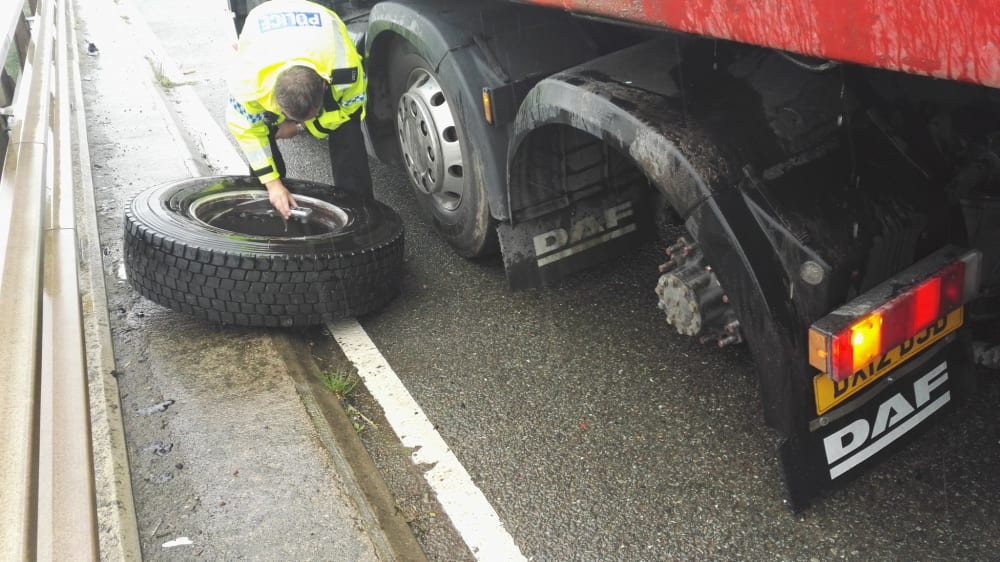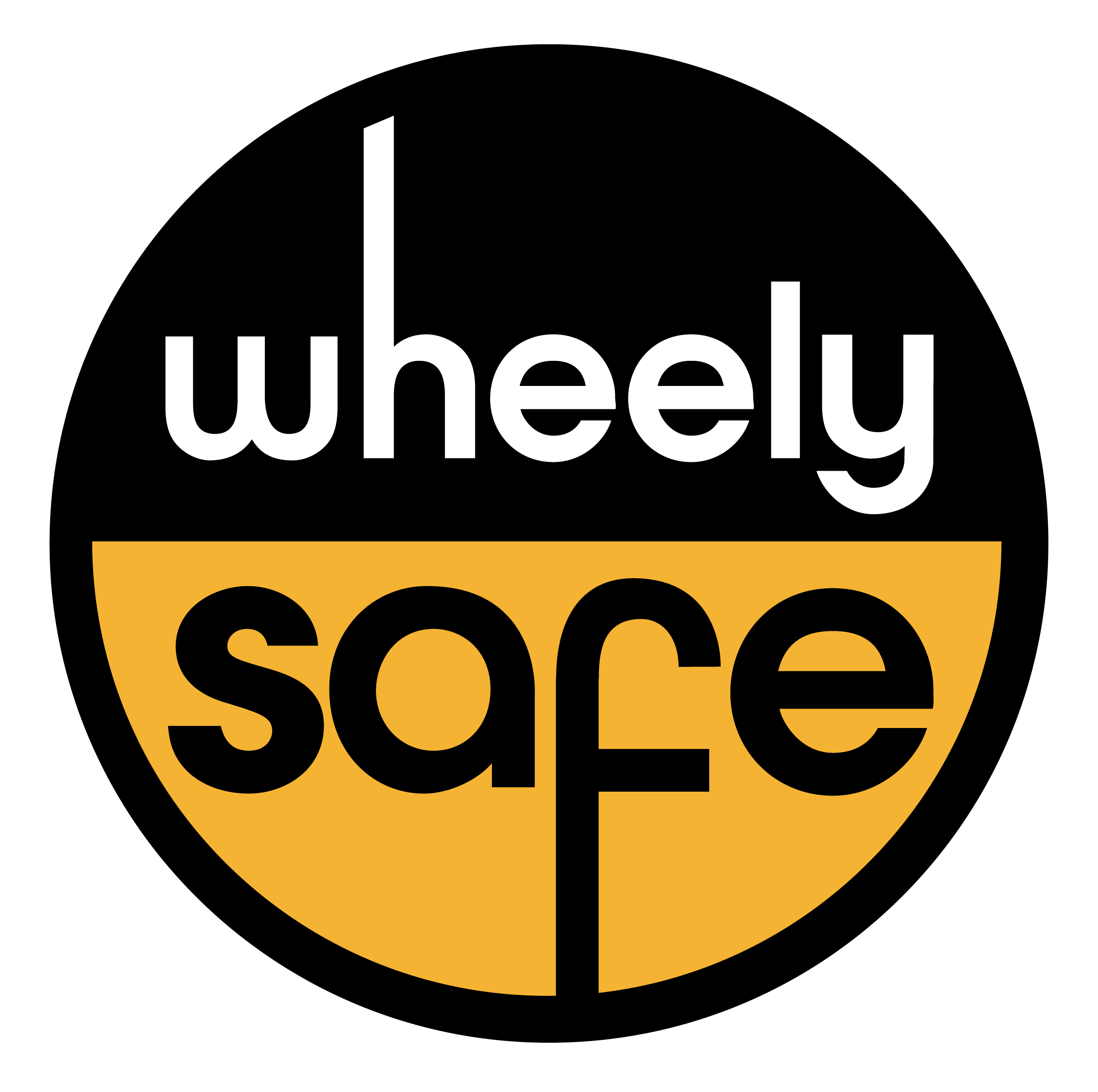20+ reasons why wheel loss can occur on commercial vehicles (and what to do about it)
Author: Gary Broadfield
Wheel loss from commercial vehicles, particularly buses, coaches, trucks and trailers, continues to be a major cause of concern for operators and is widely recognised as a global road safety issue.
Image reproduced courtesy of Cheshire Constabulary.
The result of a wheel loss incident carries multiple risks for fleet operators, including but not limited to:
- loss of life
- damage to other vehicles, buildings or street furniture
- damage to company reputation and possible court proceedings
- legal costs & settlements
- roadside prohibitions
- implications to OCRS scores and earned recognition status
- vehicle recovery costs
- vehicle downtime
- increased insurance premiums
- loss of revenue/profit
Why do wheel loss incidents occur?
The latest available research into this topic, conducted by the Transport Research Laboratory (TRL) and published for the Department for Transport (DfT), estimated that the typical annual frequency of wheel fixing problems in the UK alone stands at:
- between 7,500 and 11,000 wheel fixing defects
- between 150 and 400 wheel detachments
- between 50 and 134 resulting in damage only accidents
- between 10 and 27 resulting in injury accidents
- between 3 and 7 fatal accidents
There has been considerable research and investigative work on this subject over many years, and despite efforts to raise awareness of this issue – and the countless mechanical devices on the market – wheel detachment has remained a problem.
Loose wheel nut indicators are small, pointed tags, usually made of fluorescent plastic, and commonly fixed to the lug nuts of large vehicle wheels. The tag rotates with the nut, so that if the nut becomes loose, it shifts noticeably out of alignment with other tags. If too many lug nuts are loosened, the wheel can detach.
But these systems have a major flaw – they rely on the driver identifying the loose nuts before setting off. If the driver forgets the inspection, or if the wheel loosens during the journey, the driver may not realise until it’s too late.
What’s more, if the wheel nuts are not tightened correctly or the studs or nuts break, the driver will be unaware, and possibly travelling at speed – which will likely lead to wheel loss occurring even with these mechanical devices fitted.
Wheel loss can also occur with kerbing (a regular occurrence for buses and trucks used in urban areas, particularly rigid trucks on multi-drop distribution). If the torque wrench used to tighten nuts is out of calibration or stud fatigue occurs, it can also trigger a wheel loss accident.
Mechanical systems such as indicator tags can be used to complement a full maintenance programme – but until recently, the industry has still been missing a true all-round safety solution.
Likely causes of wheel loss
The IRTE and Logistics UK, previously known in the industry as the Freight Transport Association, compiled one of the most extensive reports published to-date in the sector on wheel loss. Within it, they identified the most likely causes of wheel loss incidents from trucks and trailers as being:
- The fixing is insufficiently tightened and thus allows the wheel to fret and wear
- The fixing is over-tightened, causing stretched/broken studs or causing studs to be pulled through the hub. It is often an unconscious act for drivers and maintenance staff to over-torque wheels, in the misguided belief that exerting extra pressure on a wheel fixing will prevent them from coming loose. Either way it will result in stud failure due to the fact the elastic limit of the material is exceeded
- Failure to regularly check tightness of wheel fasteners
- Examples of elongation of stud holes, wheel movement, wear to studs and a cracked wheel
- Fitment of incompatible wheels
- Fitment of unserviceable wheels and components
- Incorrect lubrication of threads and interfaces. Lack of initial clamping force can be due to high friction loss which can be resolved by the use of appropriate lubrication of the wheel nuts, studs and washers
- Excessive lubrication or incorrect lubrication applied to the mating surfaces of wheels
- Severe corrosion and/or wasting of wheel studs
- Studs not pressed fully into the hub or loose back nuts
- Incorrectly assembled components
- Incorrect assembly, from not following the correct torque and retorque procedure
- Paint, rust/scale or dirt on mating surfaces
- Worn wheel spigots
- Fractured or seized wheel nutwashers
- Brake drum securing screws/bolts loose, holding wheel off the hub face
- Inaccurately calibrated torque wrench or calibration date expired
- Incorrect use of air impact tools. This is a common cause of both under-torquing and over-torquing because the actual torque applied depends on a wide range of variables and is not measurable
- The power of air impact tools also often leads to problems such as cross-threading and cracked nuts and washers
- Incorrect tightening sequence
- Temperature effects: The clamp load can vary during service due to changes in temperature of the components
- Settlement from any other factor eventually causing the clamping load to become inadequate
To see the impact of wheel loss, in a real-life scenario on the road, see this video
What can be done to prevent wheel loss?
When I entered the commercial vehicle industry a little over a decade ago, I set out to solve this global road safety problem once and for all. After years spent developing a cost-effective and durable solution to prevent loss, I launched Wheely-Safe onto the market with by business partner Gary Thomas.
We offer systems to fit almost every size of medium- and heavy-duty commercial vehicle on the road, and which benefit from a host of additional features, including an intelligent tyre pressure monitoring system (TPMS).
Discover more about our solution, and how it works, when you visit our product page.
Gary BroadfieldGroup Managing Director |
|---|
Cookie policy
SAVE MONEY. SAVE TIME. MAXIMISE SAFETY.
Wheely-Safe can boost your fleet efficiency and safety overnight. Request a demo from our team today.
REQUEST A DEMOCompany Registration No. 12754234



